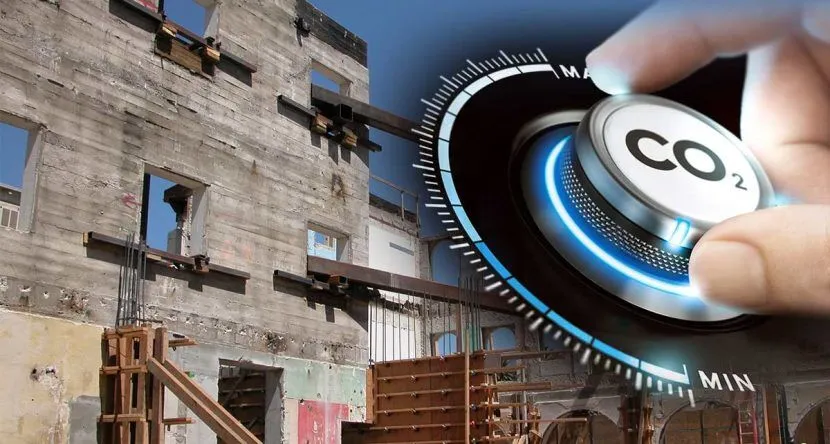The construction industry’s role in exacerbating climate change through increased global warming and carbon emissions is undeniable. This challenge is further aggravated by the ongoing urbanization driven by a rapidly growing global population. As the population rises, so does the demand for construction, amplifying the industry’s impact on both economies and the environment.
In 2021, research showed that the buildings and construction sector accounted for around 37% of energy- and process-related CO2 emissions, while consuming over 34% of the world’s energy. The industry is also responsible for nearly half of global material extraction. According to the World Economic Forum, construction contributes almost one-third of global waste, with more than two-thirds of this waste being discarded without recovery or reuse.
A closer look at emissions within the sector reveals that energy-intensive processes, such as the production of materials like cement, steel, and glass, along with the transportation of these materials to construction sites, are significant contributors. Notably, concrete production alone is responsible for over 8% of global CO2 emissions—surpassing those from the aviation sector.
The 2022 Global Status Report for Buildings and Construction estimates that Africa’s construction sector is valued at USD 5.4 billion, with an expected annual growth rate of 6.4% by 2024. In Nigeria, the sector is projected to grow by 2% annually until 2027, supported by the National Development Plan (NDP), which spans from 2021 to 2025. The NDP is also anticipated to create 21 million full-time jobs for Nigerians. However, this growth must be accompanied by strategic measures to reduce carbon emissions, emphasizing sustainable and energy-efficient construction practices.
Companies like PPC Limited have publicly committed to reducing carbon emissions by adopting energy-efficient initiatives in their building projects. Additionally, the upcoming COP28 conference, set to take place in the UAE from November 30 to December 12, 2024, is expected to be a pivotal moment for driving the construction industry toward greater environmental responsibility. Adam Ralph, UAE Country Manager at Turner & Townsend, stresses that decarbonization is no longer optional—it is an urgent business imperative that requires transformative shifts within the sector.
Recent reports from Turner & Townsend underscore the increasing pressure on the Middle East’s construction industry to prioritize sustainability and meet net-zero targets. The COP28 conference is anticipated to accelerate these changes across the Gulf region.
Achieving net-zero carbon emissions by 2050 is crucial to fulfilling the Paris Agreement’s goal of limiting global temperature rise to 1.5°C above pre-industrial levels. While the construction industry’s impact on climate change is clear, there are encouraging signs of progress through the adoption of sustainable building practices. These include energy-efficient designs, the integration of renewable energy sources, and the use of sustainable or recycled materials, all aimed at reducing the sector’s environmental footprint.
Novare has recently announced a significant investment in rooftop photovoltaic (PV) panels as part of its commitment to sustainability. This initiative aims to reduce carbon emissions across its African property portfolio by harnessing eco-friendly renewable energy. The first phase of the project, in collaboration with Enteria Moçambique, focuses on Matola Mall in Mozambique. The installation of 777.84 kWp photovoltaic panels and eight solar inverters is expected to generate 1,159,042 kWh of sustainable energy annually, resulting in energy cost savings of over 5 million MZN per year and helping offset emissions from diesel generators. In just one month of operation, the system has already saved 13.5 tons of CO2.
This project aligns with Novare’s broader sustainability strategy, which includes obtaining EDGE certification for all properties, following the successful certification of Novare Great North Mall and Standard Chartered head office in Zambia. As the first of its kind in Mozambique, this investment makes Novare a trailblazer in renewable energy solutions for commercial buildings on this scale.
Novare’s sustainability strategy is part of a larger effort to significantly reduce the carbon footprint of its property portfolio across sub-Saharan Africa and contribute to the global drive for net-zero emissions, aligning with the United Nations’ Sustainable Development Goals (SDGs).
However, achieving these objectives requires collaboration from all stakeholders. Policymakers must implement effective emission reduction tools and promote sustainable, resilient development. Industry and financial leaders must invest in innovative decarbonization solutions, and civil society must play a crucial role in driving the necessary changes.
Kumalo is the ESG & Impact Officer at Novare Real Estate, Nigeria.














